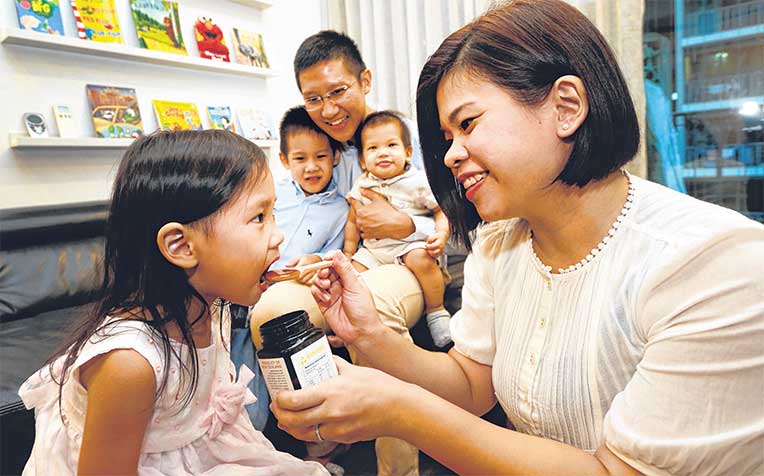
Victoria, three, a teaspoon of Manuka honey.
Housewife Catherine Koh, 49, struggled for years to help her son, Elliott, now 11, beat the flu bug and common cold.
But no matter how hard she tried, he would still be down with a virus at least once a month when he was between three and six years old.
She gave him supplements to boost his immunity, told him to stay away from sick children and also asked him to wash his hands often.
“There was nothing more I could do. At that age, he was constantly interacting with other children and the flu and cold transmission from a sick child to him was fast and direct,” she says.
“Besides, you can’t ask a little one to stay away from his friends.” Other parents say they, too, face the challenge of helping their young children avoid catching the flu and common cold.
The most common reason for this shared difficulty, they believe, is that the most effective measures that help to prevent the spread of such illnesses are difficult to enforce.
Dr Low Kah Tzay, a paediatrician at Mouth Elizabeth Hospital, says wearing a surgical mask as a preventive measure is “not very effective” in reducing the risk of a child catching a cold. “It is also not practical, as the child will feel hot and unmotivated,” he adds.
Dr Christopher Chong, a family physician, says it is more effective for a flu sufferer to wear a face mask to prevent germs spreading.
“A face mask decreases the amount of respiratory fluid and oral secretions from being sprayed into the environment and infecting others when the sick person coughs or sneezes,” says Dr Chong, who is also head of Ang Mo Kio Polyclinic, which is managed by National Healthcare Group Polyclinics.
The doctors and Health Promotion Board spokesman say a child who frequently washes his hands with soap and water is helping to protect himself against the flu.
According to the Health Promotion Board, the “simple act of washing hands with soap and water for 30 seconds reduces the germ count by up to 99 per cent”.
Mrs Koh says she did try to enforce good hand-washing habits with her son. “But it doesn’t work. He still fell sick frequently,” she says.
Dr Mark Ng Chung Wai, a family physician and chairman of Infection Control & Infectious Diseases Workgroup at SingHealth Polyclinics, says that “children imitate their parents”.
As such, even if children cannot fully grasp the concept of personal hygiene, parents should set a good example for young ones by washing their hands regularly.
The Health Promotion Board spokesman says it is good practice for parents to wash their hands together with their children.
He adds that parents can also “instil a sense of fun” into the routine by inserting a hand-washing quiz that children can participate actively in and be rewarded for at the end of their efforts.
The doctors also say hand sanitisers can be used if hand-washing facilities are not available.
Dr Chong advises parents or other caregivers to supervise their children’s use of hand sanitisers.
Ensure that only a small amount of sanitiser is used and that the child rubs both hands together until they are dry.
Dr Chong says: “This is to avoid accidental ingestion of sanitiser, which can be harmful.”
Some parents resort to homespun tips and remedies from their experiences and those of others to help their children avoid getting the flu and common cold.
Freelance writer Rachel Fong, 31, has three children aged between nine months and six years old. When she senses that either of her two older childrenmaybe catching a flu, she gives them a teaspoon of Manuka honey, twice a day. She learnt this tip from “mummy friends” and says it has been effective in nipping the cold or flu in the bud.
She is nursing her youngest child, a nine-month-old son. At night, she also pumps about 300ml of breast milk so that she can give her older children a 150ml glass of breast milk each in the morning, before they go to school.
While some doctors say there is no authoritative data to show that drinking breast milk at ages four and six can prevent coughs and colds, Mrs Fong has read alternative arguments and believes that it still has many health benefits.
But, unlike some parents who believe in giving their children supplements to boost their immunity, Mrs Fong says she does not.
“The companies which produce these pills are generally profitdriven, so I cannot be sure of what goes into them,” she says. Mrs Katherine Sng, 39, used to have the same problem as Mrs Koh – her son, Evan, now six, used to fall ill every few weeks.
About two years ago, a mother recommended her an essential oil blend, which contains eucalyptus, rosemary, lemon, clove and cinnamon extracts. Mrs Sng was told that it could help increase her son’s immunity and prevent him from getting sick.
She began applying the oil on the soles of Evan’s feet every day before he went to school, from the time he was four years old. She found that he fell sick less often, from once every few weeks to once every few months. “I cannot be sure if the oil is effective, but he catches the cold and flu less frequently now,” says Mrs Sng, a marketing specialist at VLV Chinese restaurant.
While parents have their own beliefs as to what works, they are in agreement with medical professionals that having sufficient rest and water and keeping a healthy diet and lifestyle can help to improve health and reduce the occurrence of illness in children.
Mrs Koh says her son’s condition stabilised when he entered primary school. “I believe that his body grew stronger and fitter when he began exercising more and played sports in school,” she says.
Contributed by














 Get it on Google Play
Get it on Google Play